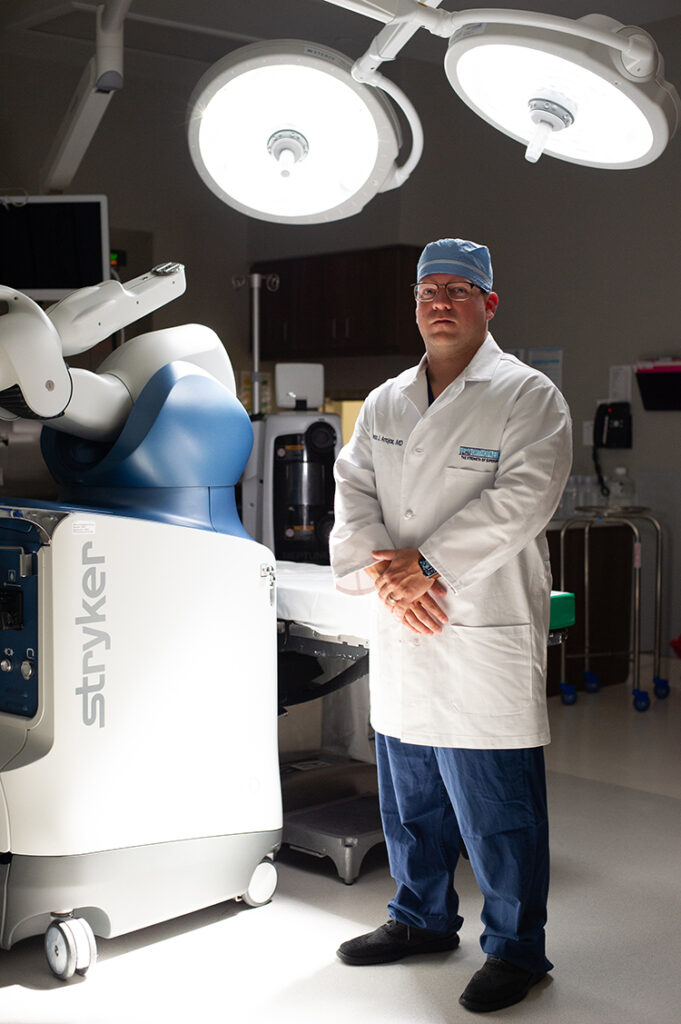Osteoarthritis can make everyday activities like getting up out of a chair or climbing stairs difficult to perform without pain and stiffness in the knee. The need for knee replacement surgeries in the United States is on the rise with more than 600,000 knee replacements being performed each year.
Fortunately, innovations in medical technologies allow surgeons to perform more accurate and precise procedures utilizing robotic assisted systems such as Stryker’s Mako System.
Dr. Alfredo Arrojas, a board-certified orthopedic surgeon with Vero Orthopeadics, specializes in total joint reconstruction. He is Mako-certified to perform total and partial knee replacements (and total hip replacements).
“One-hundred percent of my knee replacement surgeries are performed robotically,” said Dr. Arrojas. “The Mako system provides unmatched surgical accuracy, allowing for the precise placement of implants while leaving the surrounding tissue undisturbed.
“Traditional knee surgery is done with metal cutting blocks that need to be pinned in place and you have to stretch the soft tissue and skin in order to get them on correctly.
With a robotic arm I can make a cut without a metallic guide so there is less stress on the skin and tissue. We are able to do surgery without traumatizing the surrounding tissues and that leads to a quicker recovery.”
So how does it work?
Well, first a CT scan of your knee is taken. Highly advanced software reads the scan and creates a 3D model of your exact knee, helping the surgeon formulate a personalized preoperative plan.
That 3D model is uploaded into the Mako so the surgeon can see the pre-surgical plan overlaid on the real-time surgery to use as a guide.
Mako’s robot arm holds the surgical instrument, but the instruments are under the surgeon’s control the entire time. Your surgeon prepares the bone according to visual boundaries that protect the structure of the knee and removes only the part that has been affected. The implant is placed and the joint properly balanced. Your surgeon can make adjustments if needed.
“During the surgery we make an incision in the front of the knee which allows us entry to the knee with arthritis,” Dr. Arrojas explained. “The very ends of the thigh and shin bones that are worn are shaved away, just enough to fit the appliance in. The implant is made of metal and plastic with the metal parts replacing the damaged thighbone and shinbone and the plastic replacing the cartilage on the shin and kneecap. We replace all the surfaces that are rubbing together.
“Patients are walking with a walker just a couple of hours after surgery. If my patient has a good social set-up at home, I can send them home the same day. If there is no support at home or if the patient has other medical problems, we will keep them longer but no longer than 23 hours, so it’s still considered an outpatient procedure by insurance standards. Most patients will return to everyday activities in one to four weeks.”
Knee replacements should last 15 to 20 years, depending on your level of activity and health. Keeping your weight down is important because every pound you gain feels like 4 pounds on your knee and hip joints. Low-impact sports like swimming, walking, biking and golfing are safe ways to keep the knee moving.
Dr. Arrojas was attracted to the field of orthopedics because it blended his mechanical aptitude with his surgical mind.
“One of the first procedures I saw in med school was an orthopedic surgery and it just made sense. I’ve always been mechanically oriented and loved taking things apart and putting them back together as a child, and I quickly learned that joint replacement is one of the few specialties where we can change someone’s life so fast.
“We can take a patient who’s almost wheelchair-bound and make them normal again. Giving them their mobility back and relieving their pain changes everything. It’s very rewarding.”
Dr. Arrojas was born and raised in Miami, the son of Cuban immigrants, and speaks fluent Spanish. After graduating from Florida International University in Miami, he earned his medical degree from Drexel University College of Medicine in Philadelphia and completed an orthopedic surgery residency at Palmetto Health/University of South Carolina in Columbia.
Dedicating an additional year to specialty training, Dr. Arrojas earned a total joint reconstruction fellowship from The CORE Institute in Phoenix. He is now accepting new patients at Vero Orthopaedics, 3955 Indian River Blvd., Vero Beach. Call 772-569-2330 or visit veroortho.com for an appointment.

